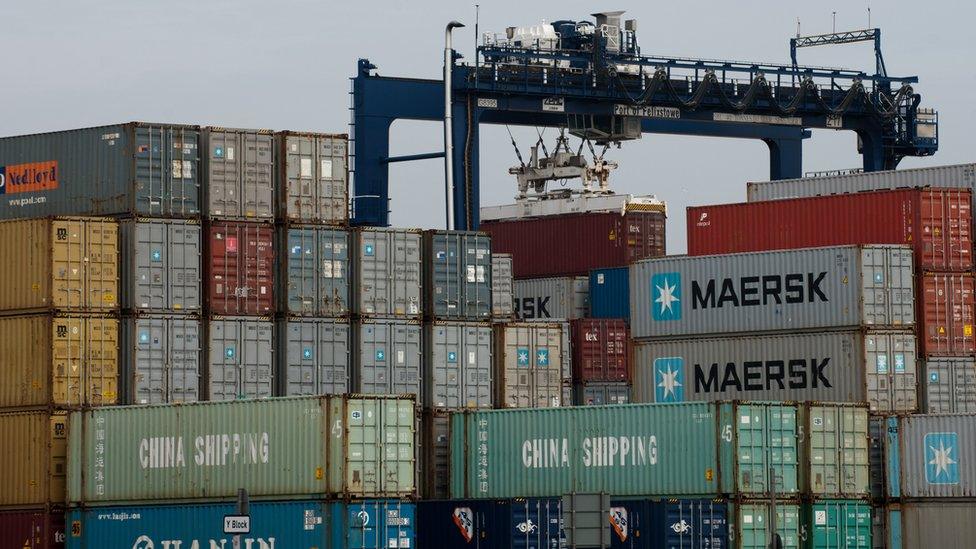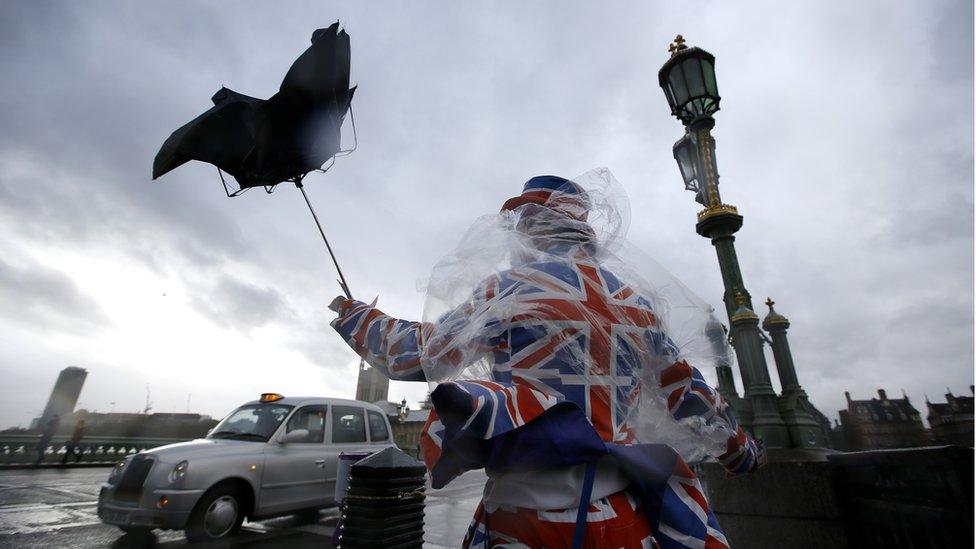UK goods trade gap biggest on record
- Published

The UK's goods trade gap with the rest of the world widened by £1.9bn to a record high of £125bn in 2015, official figures show.
The Office for National Statistics, external also warned the latest figures would have a negative impact on its second estimate of fourth-quarter economic growth.
But 2015 also saw a record surplus in the UK's dominant services sector of £90bn.
That meant the UK's total trade gap widened by just £300m last year.
The overall deficit - the difference between the amount the UK imports and what it exports - stood at £34.7bn in 2015, the ONS said.
It will publish its second estimate of fourth-quarter economic growth on 25 February.


Analysis: Kamal Ahmed, BBC Economics Editor
Britain is very good at exporting services - financial, tourism, creative and legal - where the UK's trade surplus hit a record £90.3bn.
And is notoriously bad at increasing the exports of goods as the UK struggles to rebalance its economy away from consumer consumption towards manufacturing.
The strength of the pound for most of last year is only exacerbating Britain's difficulty selling things abroad.
This has been George Osborne's headache ever since becoming Chancellor in 2010.
Most worrying, trade with Germany and China - the two significant powerhouses of Europe and Asia - weakened in the final quarter of 2015.
There is also an increasing division between the UK's performance in the European Union, where the country's goods trade deficit is widening, and Britain's trade with the rest of the world, where the situation is rosier.
Between 2014 and 2015 exports of goods to countries outside the EU increased by £3.5bn.
Businesses finally seem to be looking beyond the EU's borders for opportunities for growth.

Today's figures also contained December's trade data, which showed the deficit narrowed by £1.3bn to £2,7bn overall in the month.
The goods deficit fell to £9.9bn from £11.5bn in November, but that was thanks to a fall in imports of £1.7bn in December rather than an increase in exports.
A large part of the fall was however accounted for by depressed oil prices, which meant the cost of oil imports fell in value terms to their lowest level since February 2009.
In the three months to the end of December, the UK's trade deficit stood at £10.4bn, compared with £8.6bn in the three months to the end of September.
The UK also suffered a record traded goods deficit of £23.2bn with the rest of the European Union in the fourth quarter of 2015, as exports to other EU countries fell 0.5% and imports from the EU rose 2.7%
The trade deficit is one of the factors cited by analysts as a drag on UK economic growth, which has been exacerbated by the strengthening pound over the past few years.
'Dangerous cocktail'
A stronger pound makes UK exports more expensive for overseas customers.
The UK's overall trade deficit took its toll on growth in the third quarter of 2015, contributing to disappointing economic growth of 0.4%.
Chancellor George Osborne has warned that the economy is facing a "dangerous cocktail" of risks in 2016, ranging from slowing global economic growth to volatile stock markets and the continuing slump in oil prices.
Samuel Tombs, chief UK economist at Pantheon Macroeconomics, said the latest trade figures pointed to net trade subtracting 0.2 percentage points from quarter-on-quarter GDP growth in the fourth quarter of 2015.
"With global trade flows slowing and UK goods still uncompetitive despite sterling's depreciation since December, we expect a poor trade performance to continue to impede the economic recovery this year, " he said.
Paul Hollingsworth, UK economist at Capital Economics, said he believed concerns about a sharp global slowdown were "somewhat overdone".
But he added: "Nonetheless, any progress in reducing the trade deficit is likely to be extremely slow in the near term, leaving the [UK] recovery reliant on domestic demand."
- Published8 February 2016
- Published28 January 2016
